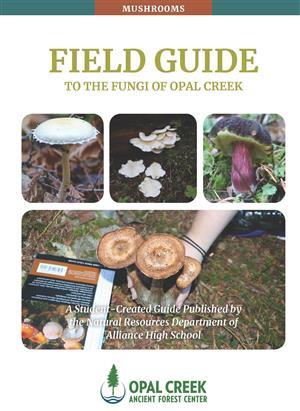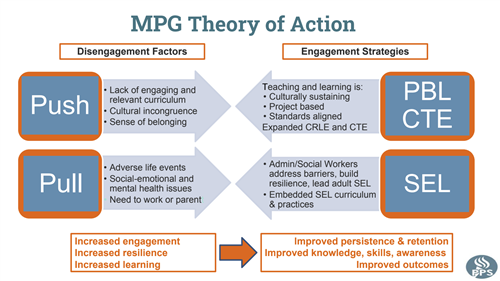-
What & Why
What is Project Based Learning?
Project based learning (PBL) is an education practice rooted in constructivism, a theory of human development that centers inquiry, direct experience, and productive struggle as primary engines of learning. Projects can be highly engaging for students when teachers use PBL within and across subject areas to involve students in solving challenging, meaningful, real-world problems. As they gain maturity and mastery, students increasingly co-create tasks with their teachers and become active agents in their own learning. Students often collaborate on projects with peers and supporting adults. Their work typically yields a product, such as a presentation or display, which they share with an interested audience or even a “client” like in the projects described below.
Project Examples: Field Guide to the Fungi of Opal Creek; A Poetry Project; Hydroponics; "Mathufacturing" a Tiny House

What are the Elements of an Effective Project?
A group of teachers, building leaders, and expert consultants associated with MPG’s PREP project created a framework for PBL that identifies six core elements of an effective project. The framework is based on the group’s input on what constitutes a highly engaging learning experience for secondary students (grades 7-12) and on how high quality PBL is defined in the field of education innovation and improvement. Teachers are encouraged to address at least four of the six elements; projects need not address all six elements to be effective.
PBL Framework & Implementation Continuum (web version)
PBL Framework & Implementation Continuum (printable version)
How does PBL advance PPS' Strategic Vision and Multiple Pathways' Theory of Action?
PPS and MPG share an instructional vision that shifts away from teacher-centered instruction to approaches where students are actively engaged in their learning. Unlike traditional pedagogy which prioritizes content-area standards, project based learning holistically integrates standards with postsecondary success skills and social-emotional development. In short, PBL is a powerful and efficient practice that engages students in deeper learning and cultivates the full range of knowledge, skills, and dispositions now envisioned for PPS graduates. Click the drop down button below for more about how PBL advances PPS' and MPG' common vision and goals for equity and student success.
-
Forward Together
In 2018, PPS launched a community-driven planning process to ensure the District provides all students with high-quality teaching and learning and closes persistent gaps in outcomes based on race. The multi-year process produced Forward Together: 2021-2025 Strategic Plan for Racial Equity, Inclusion, and Excellence. The plan presents PPS’ reimagined vision of what students need to thrive and have a positive impact as adults, summarized in a Graduate Portrait, and the educator attributes and operational priorities necessary to achieve the vision.
PPS is initially prioritizing three of the nine Graduate Portrait elements:
- Inclusive and Collaborative Problem Solvers
- Inquisitive Critical Thinkers with Deep Core Knowledge
- Transformative Racial Equity Leaders
The plan also includes a new Instructional Framework that specifies core dimensions of PPS’ shared vision for excellent teaching and learning to ensure instruction is grade-level and standards aligned, culturally affirming, deeply engaging, and data-driven. Together with high-quality instructional materials and professional learning experiences and support for teachers, the Framework is designed to propel district wide excellence and equity “in every classroom, every day.”
PPS' Multiple Pathways to Graduation (MPG) department Theory of Action, codified in 2017, anticipated many elements of Forward Together by centering relevant, inquiry-based instruction as key to engagement and postsecondary success for all students. MPG supports alternative schools and programs that disproportionately serve vulnerable students who have been pushed or pulled out of mainstream education by inequitable, inflexible systems and adverse life experiences.
-
The power of PBL and how it aligns with PPS' reimagined vision for teaching and learning is best expressed by PBL practitioners and their students. View these short videos to learn more:
- 5 Reasons Why Project-Based Learning Outperforms Traditional Instruction (3min)
- Authentic Work : Purpose : Authentic Audiences: Integrates Social & Emotional Skills : Belonging & Inclusion
- Student Voice: Experiencing Deeper Learning Through PBL (3min)
- High school student describes personal and academic growth through an immigration project
- Putting Students in Charge of Their Learning Journey (5min)
- High school students become scientists
- Community Partners: Making Student Learning Relevant (5min)
- Middle grade students in Hood River MS (OR) share culinary arts project with community chefs
- PBL Raising Student Achievement for All Learners (6min)
- Elementary students study and influence improvements in a local park
Does PBL work?
A growing number of studies and publications speak to the power and promise of PBL to improve student engagement and learning outcomes.
Most recently, two gold-standard, randomized, controlled trials of thousands of students in diverse school systems across the U.S. found that project-based learning significantly outperformed traditional curricula, raising academic performance across grade levels, socioeconomic subgroups, and reading ability.
Article: New Research Makes a Powerful Case for PBL (2021)
Analyses of meta-analytical research found PBL is more effective than traditional instruction in developing students’ long-term retention, skill development, and satisfaction of students and teachers.
Article: When is PBL More Effective? Comparing PBL to Conventional Classrooms (2009)
A causal comparative study comparing 7th and 8th grade students who used PBL to those who did not found the PBL groups performed at higher achievement levels than did the non-PBL students in mathematics and reading.
Article: The Impact of Project-Based Learning on Minority Student Achievement (2015)
- 5 Reasons Why Project-Based Learning Outperforms Traditional Instruction (3min)



